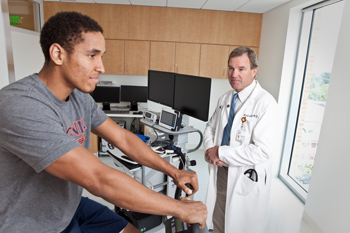Playing a sport is a great way to stay healthy. It keeps the body in shape, provides a tremendous sense of accomplishment and even brings some awesome mental health benefits. The cardiovascular rewards are second to none, but athletes of all ages have special needs when it comes to their hearts. Intense training and competition can sometimes have risks.

UVA sports cardiologist Robert Battle, MD, helps athletes of all ages safely pursue the sports they love and maximize their performance. Battle serves as team cardiologist for UVA’s athletic teams and evaluates each player before they participate.
“Our focus is on keeping athletes playing whenever we can,” Battle says. “If we find a problem, we can help the athlete understand it and weigh the risks. We have excellent trainers and medical staff available. Too often, athletes are sidelined and suffer a devastating end to their careers.”
Evaluation of Athletes
Sports cardiology is an emerging field, and Battle’s team of specialists is at the forefront of the field. Their services include:
- Assessment, including a thorough medical and training history
- EKG, or electrocardiogram, to evaluate the heart’s electrical system and check for arrhythmias
- Echocardiogram to evaluate the structure and anatomy of the heart
- Exercise stress testing to evaluate the heart during exercise
- Genetic testing when needed for inherited heart problems
“We are truly cutting edge with what we can provide,” he says. “We’re going way beyond what is typically delivered to give athletes the very best.”
Preventing Sudden Cardiac Death
Athletes who are in excellent physical condition often look incredibly healthy, but heart problems can lurk under the surface. One problem that makes headlines when it happens is sudden cardiac death. It’s extremely rare, Battle says, but something everyone wants to prevent.
Sudden cardiac death can be caused by a variety of underlying heart abnormalities that can be routinely detected with testing, Battle says. One example is hypertrophic cardiomyopathy, a condition in which the heart is unusually thick and enlarged. By catching it early, a serious cardiac event can often be prevented.
Genetic Testing Can Help Make The Diagnosis
Genetic testing is becoming increasingly helpful in determining whether or not a possible heart problem exists in an athlete. “Their doctor may see signs that are suspicious of an inherited heart problem, and we can then test for the genes linked to it,” explains Matthew Thomas, a genetic counselor at UVA who specializes in cardiovascular conditions. “Sometimes the news is good. The genetic test may reveal they do not have the condition, which allows them to continue playing.
“Sometimes the news is bad. They may carry a gene predisposing them to a serious condition, but knowing this can help us avoid a potentially fatal cardiac event. If they must stop playing a sport they love, there is still hope. We do our best to help them transition to life without competitive sports and find other passions that can provide them fulfillment.”
Staying In The Game
Some heart abnormalities are perfectly harmless, and it’s important that athletes are not disqualified in these circumstances, Battle says. For example, highly trained athletes can develop “athlete’s heart,” a condition in which the heart muscle becomes larger due to intense training. It can be mistaken for hypertrophic cardiomyopathy — and sideline an athlete — when in fact the heart is in tip-top condition.
“It’s important to have an understanding of the world of the athlete and the various training programs out there,” Battle says. “Only then can you have a true sense of the situation.”
When To See A Sports Cardiologist
Athletes of all ages can access this elite care. Common reasons to seek a sports cardiology evaluation include:
- Pre-participation screening before a sport, especially for high school or college athletes
- Chest pain or shortness of breath during training, palpitations or rapid heartbeat, fainting during exercise
- Unexplained fatigue
- Sudden decrease in performance
- Family history of heart problems
Battle’s passion for his field stems from his own participation in sports. He was a collegiate athlete who played lacrosse for Dartmouth College. He played high school baseball, basketball and football. Today, he swims three miles a day.
Most of all, he shares a passion for athletes and their cardiac health. “For a dedicated athlete, it’s not just a sport. This is their self-identity. It is what brings meaning to their lives.”
Athletes who want to enjoy sports and reduce the risks have a winning team of cardiac experts at UVA.
Need a sports cardiology evaluation? Contact our Heart Center at 434.243.1000 and mention that you are calling about heart screenings for athletes.